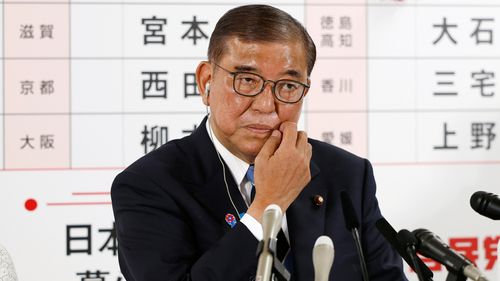Share this @internewscast.com
Japan’s Prime Minister Shigeru Ishiba has decided to step down in response to increasing demands from his party to accept responsibility for their unprecedented loss in the parliamentary election this July.
Having taken on the role in October, Ishiba announced on Sunday his resignation as the Prime Minister and leader of the conservative Liberal Democratic Party.
Ishiba, a 68-year-old moderate centrist, initially resisted pressures from more right-leaning members within his party to resign. He emphasized his intention to prevent a political vacuum while Japan navigates significant domestic and international issues, such as US tariffs, inflation, and escalating tensions in the Asia-Pacific region.

During a Sunday night news conference, Ishiba shared that he had been planning to accept responsibility for the summer election defeat for some time. However, his immediate priority was advancing tariff talks with the US, which he deemed crucial for national interests.
“Who would seriously negotiate with a government whose leader says he is stepping down?” Ishiba said.
He pointed out that the timing was appropriate after an order from US President Donald Trump on Friday, reducing tariffs on Japanese cars and other goods from 25 per cent to 15 per cent.
“Having reached a milestone in the U.S. tariff negotiations, I decided now is the time to make way for a successor,” Ishiba said.
His resignation came just a day before his party was set to decide on holding an early leadership election, a move that would have been seen as a de facto vote of no confidence if approved.
He said he made the “painful decision to resign” to avert that step because “it would cause a critical division within the party, and that is absolutely not my intention”.
Ishiba said he would instead start a process to hold a party leadership vote to choose his replacement, which is expected to be held in October. He is to remain as prime minister until a new party leader is elected and endorsed by the parliament.
He said he is not going to run, even though he regrets leaving behind unfinished business, such as measures for salary increases, agricultural reforms and further strengthening Japan’s security.

In July, Ishiba’s ruling coalition failed to secure a majority in the 248-seat upper house in a crucial parliamentary election, weakening the stability of his government. The loss followed a defeat in the more powerful lower house, where the party-led coalition lost its majority in October, only two weeks after Ishiba took over.
Party lawmakers who support the prime minister said those who lost seats were largely ultra-conservatives who were linked to corruption scandals before Ishiba took office. Public polling showed that pressure on Ishiba to resign caused his support to grow.
Calls for Ishiba to step down grew after the Liberal Democratic Party last week called for a “complete overhaul” of the party following its losses.
A conservative heavyweight Taro Aso, known for his anti-Ishiba stance, and a minister and several deputy ministers in the Ishiba Cabinet requested an early vote, prompting others to follow suit.

Former Health Minister Norihisa Tamura said on a talk show of the public broadcaster NHK earlier Sunday that the best way to heal party divisions and move forward is for Ishiba “to settle” the dispute before Monday’s vote. The party has already been distracted from necessary work on economic measures and on figuring out ways to gain opposition support in the next parliamentary session, Tamura said.
Possible candidates to replace Ishiba include Agriculture Minister Shinjiro Koizumi, as well as ultra-conservative former Economic Security Minister Sanae Takaichi, Chief Cabinet Secretary Yoshimasa Hayashi, a moderate and the protege of former Prime Minister Fumio Kishida.
Lacking a majority in both houses, the next party leader will have to work with the main opposition parties to get bills passed, experts say, or else face constant risks of no-confidence motions.
The opposition parties, however, are too splintered to form a big coalition to topple the government.











